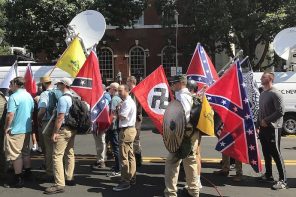Ninety years ago this Fourth of July weekend, the City Council of West Point, Nebraska passed a resolution that citizens were not to hold “assemblages not in sympathy with the war” or to distribute literature “out of harmony with the war,” that is, World War I. On April 19, 1918 the local paper reported that three Catholic priests and one Lutheran minister “were not permitted to preach last Sunday,” because they violated Nebraska’s Sedition Law. ”No alien enemy may act in the capacity of preacher…without having first filed an application in district court…The applicant must show when he came to this country, what places he has been, what steps taken toward completing naturalization and what contributions he has made toward winning the war.”
Fathers Grobbel, Roth, and Brasch and Pastor Mangelsdorf, not yet citizens, “appeared in court the next week. Each stated his sympathy to the American cause and stated they were in the process of becoming citizens. They were granted licenses to preach…Area residents who had not completed all necessary paperwork to become U.S. citizens fell into the category of possible enemy aliens.” A woman accused of being unpatriotic “denied the charges and mentioned her husband had purchased Liberty Bonds and that she had donated to the Red Cross.” A new and prize-winning history of West Point adds: ”The case came to an end when the armistice was signed in November.”
I came across this while doing research before speaking at my natal town, West Point, for its one hundred and fiftieth anniversary last weekend. The Sedition Law was passed in a fit of anti-German sentiment and violence during the War. The story of anti-German-language legislation in Oregon, Nebraska, and elsewhere is familiar, and there were thousands of West Points where scenes like those just described were common. Things have quieted. Today the town (of three thousand plus people) is 87.2 percent White Non-Hispanic (and 12 percent Hispanic), and still numbers 54.2 percent citizens of German ancestry, along with 5.5 percent of Czech and 4.6 percent of Swedish descent. Germans there are obviously safe and prospering. So why bring up this history here and now?
Independence Day Weekend provides occasion, among those who care, not only to barbecue, watch fireworks, wave flags, and watch parades—I did three of the four, so I should qualify as 75 percent patriotic—but also to review our history and reflect on it. This item about wartime hysteria, the impulse to be suspicious and fearful and hence macho about “true Americanism”, is matched in numberless American stories. It is almost embarrassing to place anti-German madness during World War I in a context of ferocious hostility against Native Americans, African-Americans, and Asians (recalling the concentration camps our government set up for every Japanese-American we could catch) but sometimes milder cases illumine the more extreme ones.
Why pick at the old scabs? Answer: Because in this long, long war suspicion is raised again, this time against Arab-Americans, profiled potential terrorists, anyone and anything Muslim. If we would learn from history, we might have fewer instances of harassment and embarrassment shown to those who do not appear to be quite like “us”, the patriots, who are inconveniencing ourselves so much—tell us how!—to “win” the war against terror. But I don’t want to conclude that way. Noticing how relatively at peace our West Points and many big communities are, how ready the majority of Americans are to tell poll-takers that they are not religiously and racially prejudiced, we do have cause to celebrate, without, I think, needing licenses to preach. Yet God bless America.
Sightings is a publication of The University of Chicago's Martin Marty Center.




